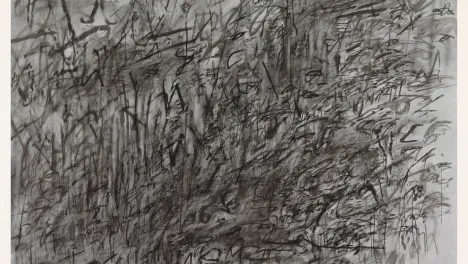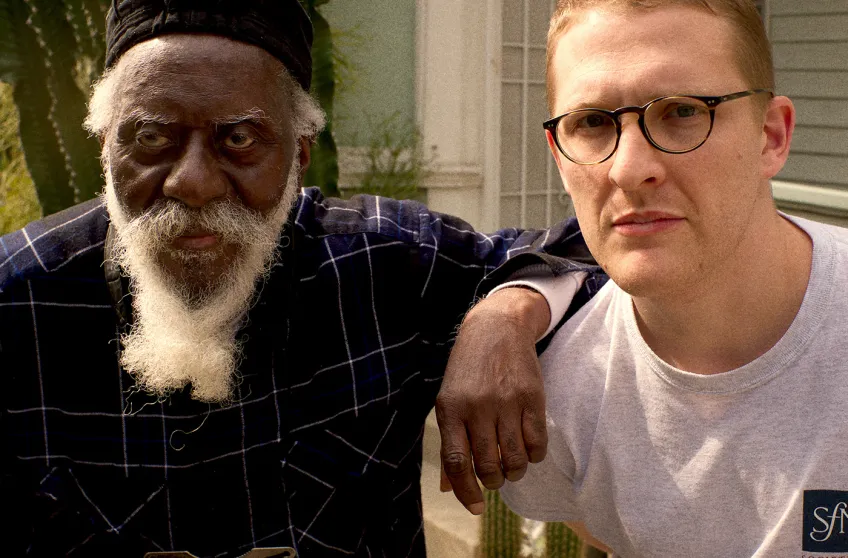
West Coast In-Person Premiere of Promises: Through Congress
Overview
Enjoy the West Coast in-person premiere of Promises: Through Congress, featuring the 2021 Mercury Prize-shortlisted album Promises (Luaka Bop, 2021) from Floating Points, jazz titan Pharoah Sanders, and the London Symphony Orchestra, and celebrate closing night of the Invisible Sun exhibition with DJs on the East West Bank Plaza at The Broad.
Shot on location at The Broad, Promises: Through Congress is a collaboration between Broad collection artist Julie Mehretu, electronic music composer Floating Points, AKA Sam Shepherd, and filmmaker Trevor Tweeten. This 46-minute film pairs a visual exploration of Mehretu’s expansive painting Congress (2003), on view in Invisible Sun, with the acclaimed album Promises.
Promises is one of the best reviewed albums of the year, earning a 9.0 Best New Music designation from Pitchfork, a New York Times Critics' Pick, 5 out of 5 stars from The Guardian and The Times UK, and described by The New Yorker as “a remarkably intimate experience.”
Advance tickets are free and required to enter the museum to view the screenings of Promises: Through Congress.
The East West Bank Plaza at The Broad is open to the public without admission to the museum.
Schedule
Details
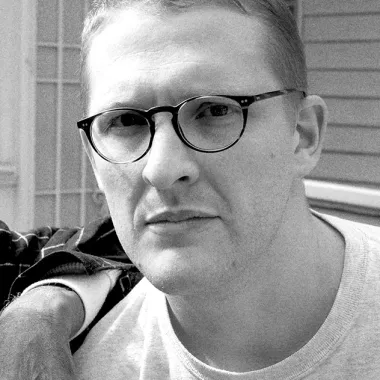
Floating Points
Sam Shepherd, known professionally as Floating Points, is a 2021 Mercury Prize-shortlisted British electronic music producer, DJ, and musician. He is the founder of Pluto Records, co-founder of Eglo Records, and was the leader of a 16-piece group called Floating Points Ensemble. Raised in Manchester, England, Shepherd studied piano at Chetham's School of Music before receiving a PhD in neuroscience and epigenetics at University College London. He also worked as a DJ at Plastic People, a London club, in the late 2000s. Shepherd's musical influences include Claude Debussy, Olivier Messiaen, and Bill Evans. He began releasing work under the Floating Points moniker in 2008, and in 2017, toured with The xx. Between 2019 and 2020, Shepherd collaborated with jazz saxophonist Pharoah Sanders and The London Symphony Orchestra for the album Promises, which was released on March 26, 2021, to critical acclaim. It was the first major new album released by Sanders in nearly two decades.
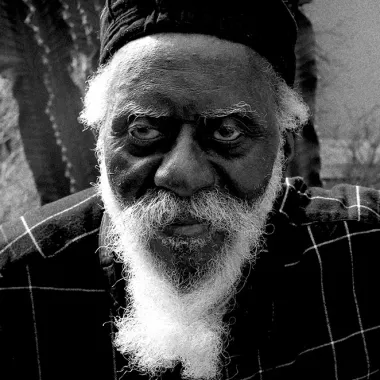
Pharoah Sanders
Pharoah Sanders possesses one of the most distinctive tenor saxophone sounds in jazz and is highly regarded by many jazz fans. He made his name with expressionistic, nearly anarchic free jazz in John Coltrane’s ensembles of the mid-1960s. In the years after Coltrane’s death, Sanders explored other, somewhat gentler and perhaps more cerebral avenues—without, it should be added, sacrificing any of the intensity that defined his work as an apprentice to Coltrane.
Pharoah Sanders (his given name, Ferrell Sanders) was born into a musical family. Sanders’s early favorites included Harold Land, James Moody, Sonny Rollins, Charlie Parker, and John Coltrane. Known in the San Francisco Bay Area as “Little Rock,” Sanders soon began playing bebop, rhythm & blues, and free jazz with many of the region’s finest musicians, including fellow saxophonists Dewey Redman and Sonny Simmons, as well as pianist Ed Kelly and drummer Smiley Winters. In 1961, Sanders moved to New York, where he struggled. Unable to make a living with his music, Sanders took to pawning his horn, working non-musical jobs, and sometimes sleeping on the subway. During this period, he played with a number of free jazz luminaries, including Sun Ra, Don Cherry, and Billy Higgins.
In 1964, Coltrane asked Sanders to sit in with his band. The following year, Sanders was playing regularly with the Coltrane group. Coltrane’s ensembles with Sanders were some of the most controversial in the history of jazz. Their music represents a near total desertion of traditional jazz concepts, like swing and functional harmony, in favor of a teeming, irregularly structured, organic mixture of sound for sound’s sake. Strength was a necessity in that band, and as Coltrane realized, Sanders had it in abundance.
Sanders made his first record as a leader in 1964. After John Coltrane’s death in 1967, Sanders worked briefly with his widow, Alice Coltrane. From the late 1960s, he worked primarily as a leader of his own ensembles.
In the decades after his first recordings with Coltrane, Sanders developed into a more well-rounded artist, capable of playing convincingly in a variety of contexts, from free to mainstream. Some of his best work is his most accessible. As a mature artist, Sanders discovered a hard-edged lyricism that has served him well.
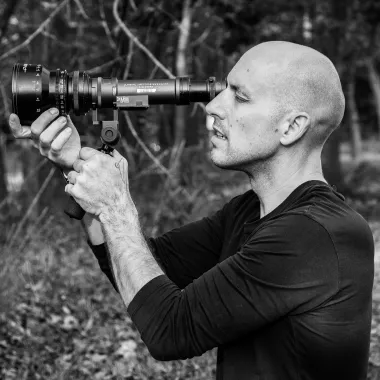
Trevor Tweeten
Trevor Tweeten is a New York-based artist and cinematographer working at the crossroads between film, sculpture, and installation. As a cinematographer, he has realized a number of projects—ranging from narrative to documentary to experimental, and film and video installations with various artists—including long term collaborations with Richard Mosse and Ben Frost, as well as working with Tacita Dean, Christo, and Anicka Yi. Tweeten is a frequent film collaborator with LA Dance Project, directed by Benjamin Millepied, and several other choreographers and dance companies. His work is often noted for its strong imagery and lyrical visual style, and has been shown internationally, including at the Venice Biennale, Barbican Centre, Louisiana Museum, Palais de Tokyo, Akademie der Künste, Berlin, and the National Gallery of Victoria, among others.
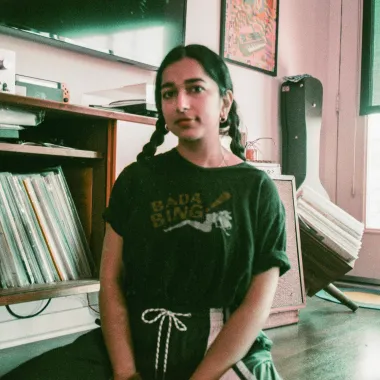
Radha
Radha is a multi-disciplinary artist and first-generation Indian-American based in Los Angeles. Her creative inspiration stems from her cultural roots, spiritual background, love for nature, and deep passion for music. While studying animation and digital arts at USC, she became a staff designer and DJ at USC’s radio station KXSC, where she immersed herself in the underground music scene, created lasting friendships, and began forging a career path as a visual artist within the music sphere. Radha spent several years working in the live music sector as a designer and marketer, eventually becoming the art director for Spaceland Presents. She now leads her own independent design studio, creating bespoke projects for a multitude of clients.
In 2018, Radha co-founded mmarz, an open-format online mix series featuring DJs both near and far. In late 2019, she began her monthly residency ‘Sacred Space’ on NTS Radio, which explores a calm, international soundscape of folk, jazz, ambient, and classical music. In 2020, she and her brother Bharat launched the beverage company Bala Chai, offering a modern take on the chai from their youth.
She uses each of these avenues to share the stories and cultural traditions that matter most to her. Radha is proud to be a part of the diverse creative community in LA and strives to inspire and collaborate with others through her art practices.
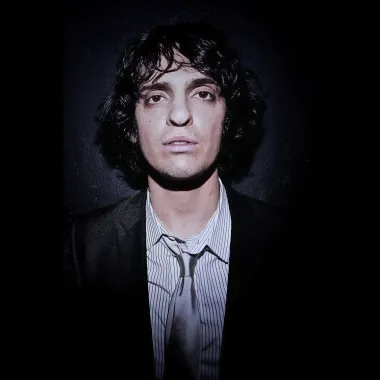
Egon
Eothen Alapatt, AKA Egon, is the founder and president of Now-Again Records since 2002. He is the creative director of the J. Dilla Estate and is partners with Madlib in the production company Madlib Invazion and was Stones Throw Records’ general manager from 2000 until 2011. Egon has taken Now-Again on a journey across the world, tracking down artists, brokering licenses, and researching and issuing anthologies from the 1970s musical scenes of countries including India (Atomic Forest), Indonesia (Those Shocking Shaking Days), Zambia (Rikki Ililonga and Musi-O-Tunya, WITCH, Ngozi Family, Amanaz etc.), Zimbabwe (Wells Fargo), Ethiopia (Ayalew Mesfin), Nigeria (Wake Up You!), and Iran (Kourosh Yaghmaei). Egon published a series of books through his Sinecure Books imprint. Funk Archaeology, his music writing column for NPR and Red Bull Music Academy, summed up his approach to musical discovery and received praise from various news outlets. The Wire wrote: “Funk Archaeology remains passionate and accessible, full of insight and rather catholic in its tastes as it spans everything from the psych scenes of Recife and South Korea to funk from the Carolinas.”
